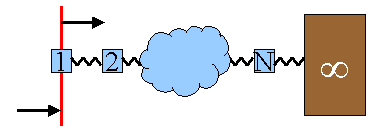Statistical Physics & Control Theory: Model Reduction

The world of complex systems is highly structured and is subject to both internal and exterior sources of noise. Consequently the current framework provided by statistical mechanics is insufficient to appropiately describe complex systems since it is best applied to closed, homogeneous systems. (Robust) Control theory, on the other hand, is adept at dealing with nonhomogenous systems subject to all sorts of uncertainty.
We have been synthesizing ideas and methods from statistical
mechanics, dynamical systems, and control theory in order to provide
a suitable framework from which to quantitatively better understand
complex systems. In particular, in collaboration with the control
theory group at Caltech, we have been attempting to repose thermodynamics
in a control theoretic language. The translation is currently being made
in the context of statistical electronics.

Within statistical mechanics, thermodynamic quantities are effectively interpreted as ensemble averages of observables and the underlying dynamics never explicitly enter into the picture. This latter issue is usually swept under the rug, the usual justification being that the system sufficiently mixes or satisfies the ergodic hypothesis. To Boltzmann, the ergodic hypothesis essentially means that all infinite time averages are equal to ensemble averages (with an appropriate Boltzmann weight). To Gibbs, this criterion is weakened to more vague notion of "sufficient mixing" where trajectories in phase space mix enough such that the time average of important quantities (observables) are equal to their ensemble averages.
Additionally, the fact that only a handful of quantities are able to appropriately characterize the bulk behavior of the unnumerable constituents of the system is construed as an instance of a physical "transition" (i.e. emergent behavior of the system). However, within control theory, this paradigm may be simply understood as falling out of an approximation theory. The area of control theory that addresses the question of approximating high order systems by lower order ones is called model reduction. Model reduction techniques allows one to make controlled approximations without necessarily taking the thermodynamic limit and without losing all dynamical information. Obtaining equilibrium thermodynamics from this approach then amounts to simply taking some formal limits.
We have also been investigating the interrelation between model reduction and reduction techniques already commonly used in statistical mechanics.